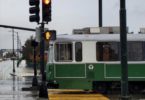By Jintao Zhai
Boston University News Service
BOSTON — Amid intermittent construction work aimed at modernizing the decades-old regional transit system, the Massachusetts Bay Transportation Authority closed down the entire Orange Line and the Green Line’s downtown section starting Aug.ust 19, forcing commuters to consider other options for travel in September.
This is the second time MBTA travelers have experienced a hit on their daily commute route —, as Greater Boston’s public transportation system shut down rails running from the airport to Bowdoin station in April and May. To make up for restrained traveling options, MBTA announced last Thursday that it would re-open the ferry service from East Boston’s Lewis Mall to downtown’s Long Wharf, starting Sept. 12.
Commuters expressed their dismay at these repeated operations efforts, balking at what Rep. Aaron Michlewitz (D-Boston) called a “win for residents across our community.” Their worries were compounded by several tunnel repairs and closures this year, as well as injury incidents along the still-opening MBTA stations.
Houssam Benna, an East Boston daily commuter, said MBTA had long been a convenient means of travel that spared him the anxiety of having to “drive a car in the crazy traffic,” so the state and city officials’ decision to close that down upset and inconvenienced many, including him.
He added that he had to resort to shuttling in May, which substituted Blue Line operations during repair, a process that he speculates was funded by increasing MBTA fares.
“I don’t know how [state and city officials] would provide funds, but in the past year, the price has just kept going up. It sucks. It’s not good,” said Benna of the now “disorganized and crowded” shuttling service. As an employee in an East Boston apartment complex, Benna commutes back and forth across the waterfront, saying he would choose to drive instead of taking the ferry, let alone the shuttle.
In addition to mechanical issues and collisions, overcrowding in the train station can be a nuisance for commuters, and once he had to wait for four turns to get on a Green Line train, Benna said. Despite this, “there are no better alternatives. It’s just those things that unfortunately still need improvements,” he added.
A public transit blip can be a boon to paid private transportation. For Uber drivers like Mauriceia Daluz, commuters’ discomfort at the train has turned their attention to traveling by cabs.
More people are taking Uber, especially in the East Boston and downtown areas. Notwithstanding repairs at the Sumner Tunnel, commuters often have to take cabs to go to work. Daluz said before the MBTA shutdowns last this summer and this fall, her income from Uber had remained scarce, with fuel prices rising and some people still having misgivings about traveling in a closed space during the last months of the pandemic.
“I saw an 8% increase in income,” said Daluz, who now drives Uber only in the early morning due to the tunnel’s “all-the-time” congestion. She said she is happy that the MBTA has partly closed, a reaction to today’s transit pandemonium shared by few.
Feature photo credit: Jintao Zhai / BUNS




